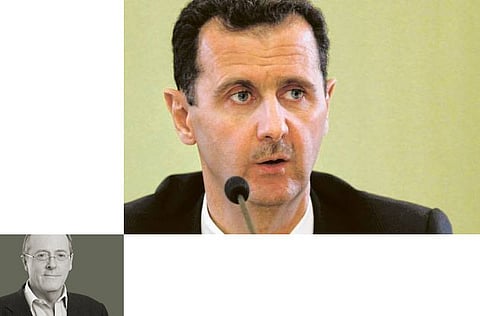Arab countries should take a genuine lead on Syria
There is urgent need to look beyond the West’s rhetoric for a solution in Syria

Following the wave of the Arab Spring, a western-minded intelligentsia anticipated that Syria’s Baathist regime would collapse swiftly. Rather brave foreign actors supplied arms to both the civilian population in revolt and a growing number of imported well-trained foreign extremists. It was obvious that the Bashar Al Assad regime, being a dictatorship, would defend itself with all possible means, including cruelty and little respect for human beings. Eighteen months later, the results are there: A country deeply dragged into civil war, thousands of casualties, atrocities and horror everywhere. The only point everybody agrees on is that the Syrian people are suffering as they probably never did in the past.
How did we get here? Besides the fact that whoever seizes power by force rarely hands it over peacefully, actors in the conflict have forgotten two major characteristics that do not make Syria a country where one would simply come and “bring in democracy”.
The first element is the secular nature of the Syrian regime — a consequence of the high number of minorities. Fighting the regime would then necessarily lead to an inter-community and religious confrontation. Having nothing to lose, the Alawite regime would fight until the end.
A second element is the role of Syria in the region, where it is an ally of Iran. Instead of fighting that “big piece”, some conveniently preferred to finance a proxy war, whatever the cost for the Syrian people.
As a result, Syria may be completely destroyed and successively dismantled.
In a far-sighted article emphasising the risk of a forthcoming war in the whole of Middle East, analyst Patrick Seale recently wrote: “Disastrous as it is, the Syrian civil war is only a sub-plot in a far wider contest,” and then to avoid it, urged Arab countries “to stop siding with the US and Israel in the destruction of Syria and Iran” and “shift alliance towards a regional gathering who would look first at Arab people’s interest”.
For more than half a century, some Arab countries have been selling their oil to the US, who would pay for it in its own currency — which means paying very little since money is printed whenever necessary. In exchange, security and freedom to manage some worldwide issues were granted. It is difficult to believe such mutually beneficial alliance be overthrown for unspecified advantages, especially in light of what is perceived as an Iranian threat.
Without challenging an alliance with the US, some others deemed it more rewarding to open-up the international relationship context. Would it only be because of the silly American “war against terror”, which makes of any Arab a potential terrorist or the never-ending Palestinian struggle against America’s best ally Israel? Why wouldn’t these countries now talk to all parties concerned, including Iran? Something which former envoy Kofi Annan had started to do until he was fired, while his successor, Lakhdar Brahimi, is unfortunately known to be unable to go along his own route independently.
The Baathist regime knows it will never rule Syria again as it did in the past. Some Arab countries have started acknowledging that a “straightforward” victory by the rebels in Syria can be long and painful to achieve, thereby increasing the terrorist threat in the whole region. Beyond the usual Israeli gesticulations about striking Iran because of its “forthcoming nuclear capacity” must we not remind ourselves that peace based on nuclear balance and deterrence precisely implies there is “a balance”? Arab countries must now discuss with every party concerned and put the major issues on the table.
Alliances develop along countries’ interests, which can change. Who doesn’t remember that the present Iranian regime has been in place because of America’s decision to stop supporting the Shah? Who will forget that Hassan Al Banna did not hesitate to offer his services to the Nazi regime in 1935 because it helped him against the British? It is time indeed to be innovative, to get rid of slogans imposed by western thinking machines who apply their own analysis grid irrespective of specific situations. Isn’t there something else for the people than having to choose between dictatorship and extremism?
The road to Damascus cannot limit itself to a dialogue with a disguised Muslim Brotherhood, as Europeans have been doing so far. It also passes these days through Moscow and Tehran — if one wants to stop the abominable Syrian reality, or be held responsible for it.
Luc Debieuvre is a French essayist and a lecturer at IRIS (Institut de Relations Internationales et Strategiques) and the FACO Law University of Paris.



